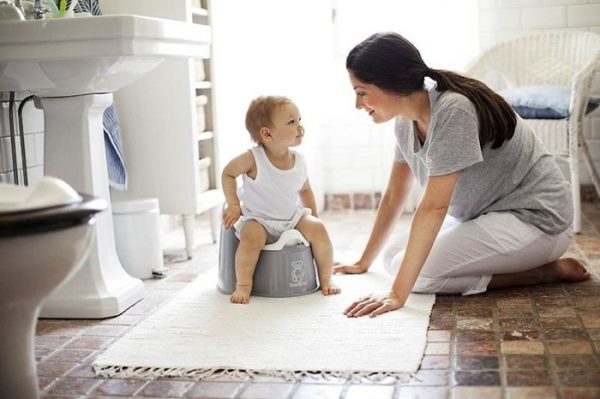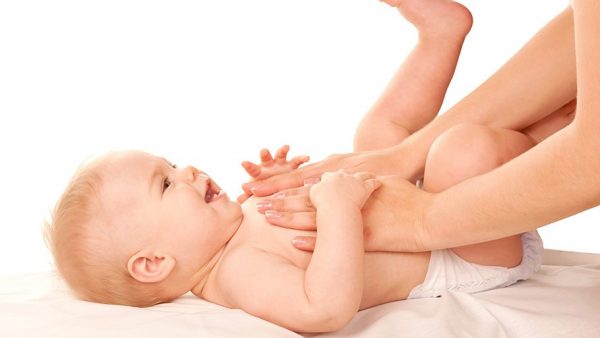In the first months of life, many children experience constipation; as statistics show, almost every fourth child suffers from a lack of bowel movements in the first twelve months of his life. The causes of constipation in a baby during breastfeeding can be varied, but not many parents know what to do in such a situation. It is for this reason that in this article we will describe in more detail the reasons for which a child’s bowel movement may be delayed, as well as how the baby can be helped.
The most common reason for the absence of bowel movements is a lack of fluid in the child’s body, that is, the mother does not give enough water to the child, for this reason the baby experiences constipation. In addition, the cause may be a woman’s lack of milk, a sudden change in the baby’s diet, various allergic reactions and malfunctions of the digestive system. To accurately determine the cause, you should be examined by a doctor and undergo the necessary tests.
Normal stool in an infant
When a baby is just born, in the first three days there will be no more than one or two bowel movements; during this period, such bowel movements are normal. As the mother's milk supply increases, the baby will begin to go to the toilet more often.
At first, the stool looks dark and thick, as fecal matter accumulates in the child during development. As soon as the mother begins to feed the baby milk, the stool will become soft and lighter, which is normal. Most often, stool is yellow or yellow-brown in color.
Enema for constipation in a newborn baby
In the first month and a half of life, the child’s body improves digestion, for this reason stool can occur from two to five times a day, but if the child goes to the toilet less than twice, this is not considered a deviation. It is important that the baby fully gains weight and empties the bladder.
Interesting: How to wean a child off a pacifier quickly: effective tips
After a month and a half, the number of bowel movements decreases, but five times a day can still remain the norm. There is no need to worry if the baby goes to the toilet only once, this is the norm, but the volume of stool in this case should be significant.
Parents should be concerned if:
- the child has bloating;
- the baby becomes restless and sleeps poorly;
- bowel movements occur less than once a day;
- the child refuses to eat;
- vomiting occurs;
- the stool becomes dense and dark.
All these signs may indicate the development of constipation in a child. In this case, you should consult a doctor; you should not prescribe laxatives yourself, so as not to harm the child’s health.
Cotton swab for constipation in newborns
In the first months of life, many infants torment their parents with constipation. Their intestines cannot function properly. Sometimes failures occur that cause a lot of trouble for both the child and the mother.
If this phenomenon occurs too often, then you need to consult a doctor. Quite often, mothers themselves try to relieve their newborn from constipation. Massage, beetroot juice, enema, oil are used.
These remedies are not always effective, because first you need to find out the cause, and only then think about how to help a baby with constipation.
Types of constipation
This problem is one of the most unpleasant, as it causes great concern to the child. He cries, is constantly capricious, cannot sleep and refuses to feed.
Not all parents understand the reason for this phenomenon, so they quickly begin to do an enema or give the baby juice. If the baby has not gone to the toilet for more than two days, you should be wary. This is a real sign of constipation. Very tiny babies can have bowel movements 3-4 times a day. With age, this number decreases to two.
It is necessary to be observant and monitor the child’s condition. Some babies may not go to the toilet every day, but they are happy, alert and well.
If the baby still does not have a bowel movement, and at the same time screams, refuses food, and does not sleep, it means that he simply cannot go to the toilet.
There are two types of constipation:
- Organic. This condition occurs rarely and is detected in the maternity hospital. In this case, the intestines are initially built abnormally, so the baby simply does not know how to poop. Conventional means cannot help here; it must be treated surgically.
- Functional. This phenomenon is much more common and is associated with stool retention in the body. The task of parents is to identify the cause in time, and only then select the appropriate treatment. Medicines are not always used. Sometimes beet juice, massage, vegetable oil or an enema can help.
Causes
In order to choose the right treatment, you must first understand the causes of stool retention. There are several of them.
- Mom's poor diet.
All babies are very dependent on their mother's diet. That is why it is so important to monitor the foods she eats. Some of them may well cause constipation. These include baked goods, bananas, rice, nuts, a lot of meat, large amounts of black tea and coffee, and sometimes juice. You should not completely give up these products, you just need to limit their consumption. - Lack of water. It is especially common in bottle-fed infants. The solution is obvious - provide the baby with plenty of moisture.
- Disturbance of microflora.
Taking antibiotics by the mother often has a negative impact on the condition of the children. This can often cause constipation in a newborn. - Change of food.
If the child was previously fed only breast milk, and then suddenly switched to artificial feeding, he will certainly feel discomfort. His digestive system simply does not have time to rebuild. - Early complementary feeding.
Many mothers cannot wait to give their baby “regular” food from the first months. Pediatricians advise not to rush into this. Complementary feeding should be introduced at least when the baby reaches six months. Feeding earlier can have a bad effect on the baby’s digestive system. - Mother's lack of breast milk. The baby's body is waiting for food to digest, but there is little of it. This leads to constipation.
- Other reasons.
Even a short separation from the mother can negatively affect the condition of the baby. Sometimes other reasons, such as teething, contribute to stool retention.
How to fix
Before starting treatment, it is worth clarifying that the child actually has stool retention, and only then starting treatment. It is necessary to pay attention to his condition and well-being. If you have any difficulties with this, it is better to consult a doctor. How should it be treated?
Many modern parents are interested in medications that can be given to their infants. However, pediatricians do not recommend treating babies with them. Laxatives are definitely contraindicated for newborns.
You can only give Duphalac based on lactulose. However, it does not act quickly. If children have already had stool retention for quite a long time, this medicine will not help.
There are other proven means:
- Mild constipation can be cured by drinking beetroot juice. Attention: it is not recommended to use it in case of severe stool retention. It is used only as a prophylaxis and for mild constipation. If the child is already suffering with all his might, cannot poop, is capricious and cries, you should choose another remedy and use beet juice as a preventive measure. It improves the functioning of the digestive system.
- Massage. Another remedy that is an excellent prevention. It can also be done for very mild constipation. Massage helps not only to get rid of stool retention in the future, but also to improve bowel function. The massage should be done using gentle circular movements. This treatment is simple: the mother can lightly stroke the baby’s tummy clockwise. This massage will help the baby cope with the problem. If constipation does not go away, you can try this remedy: lightly hold the baby close to you. Mother's warmth will help him go to the toilet and get rid of poor health. You need to do the massage very carefully. It is better to consult a doctor before this, since there is a risk of damaging the delicate and fragile organs of the baby.
- An enema should be done only as a last resort and only with the permission of a doctor. You shouldn't just do an enema at home. Some parents consider it effective, but this is a big misconception. An enema only washes away the natural intestinal microflora, without contributing to the aggravation of the situation. Stool retention will recur in the future again.
If other means do not help, you can do an enema. To do this, you need to fill a small enema, 25 ml in volume, with warm boiled water, take vegetable oil, lubricate the tip of the tip with it and insert it into the baby’s rectum. The water should be released gently and gradually. The baby should begin to have bowel movements soon. The oil can also be mixed with water and then given an enema.
You can also use butter. Candles made from it not only relieve delays, but also soften the inner surface. Another extreme measure is vegetable oil on the tip of a pipette.
You can’t just resort to this method! It is used in cases where other recipes do not help.
Quite often, when teething, infants experience stool retention. There are several reasons for this. Perhaps the child simply has poor nutrition or high intestinal activity.
Some doctors regard stool retention during teething as a normal phenomenon. The appearance of the first teeth always causes a lot of anxiety for parents.
Children become restless and their temperature rises.
Constipation is also possible during teething. In such a situation, it is better to consult a doctor.
First aid
If nothing can be given to the child, and constipation does not go away, you should start doing a careful, gentle massage. First, the baby's tummy should be warmed. To do this, use a warm napkin or towel.
Then you need to massage using gentle circular movements, lightly pressing on the tummy. Very often this helps. If the massage does not bring results, you can help the baby do a couple of exercises, such as a bicycle or scissors.
The child will pass gas and have a bowel movement.
If standard treatment does not bring results, you can resort to more “heavy” means. These include glycerin suppositories and other drugs that irritate the intestinal sphincter. An enema should only be done after consulting a doctor.
Prevention
Constipation in newborns occurs frequently, and sometimes it is impossible to predict. However, there are a number of recommendations that will help somewhat avoid this unpleasant phenomenon:
- Give your child beet juice in small quantities. But it is better to do this if the baby has already eaten “adult” food. If he has not yet become familiar with such food, he should not be given fruit juice or pulp. Otherwise, the intestines will become even more upset.
- You should consult a pediatrician about the problem. Doctors give valuable instructions to help avoid this phenomenon.
- It wouldn't hurt to do a light massage. Even the most gentle stroking of a child's soft tummy by a mother's hand brings him relief. You should not make too sudden and strong movements, you should be careful.
- Mom needs to watch her diet, eat as many light, nutritious foods as possible. It is better to limit the consumption of baked goods and sweets.
If constipation does occur, do not be too scared and immediately rush to give your child juice, butter or do an enema. It is worth showing the baby to the doctor to find out the cause.
A common cause of sleepless nights for young parents is disruption of the child's developing intestinal tract: colic, flatulence and constipation. According to statistics, every fifth baby suffers from the latter. Typically, formula-fed or mixed-fed babies are susceptible to this unpleasant disease, but infants are also at risk.
What is the cause of constipation and infants, how to avoid it, what emergency measures can be taken and how to ensure comfortable digestion for the baby - tasks of paramount importance. Parents' non-serious attitude to this problem or the use of medications and treatment methods inconsistent with the pediatrician is fraught with a lot of complications for the baby at an older age.
What can be considered constipation in a baby?
From a medical point of view, constipation in a child under one year of age is considered difficulty in defecation or lack of bowel movements in the last 24 hours.
This concept is quite vague, since it is closely related to the specific age of the child: in a bottle-fed baby and in an infant, the frequency and consistency of stool will differ significantly.
For example, for newborns under the age of one month, the norm is to have bowel movements in the same amount as there were meals. This is for breastfeeding. For an artificial child, the norm is only 2–3 bowel movements per day.
Source: https://okishechnike.com/info/vatnaja-palochka-pri-zaporah-u-novorozhdennyh/
Main signs of constipation in a baby
Before you find out what to do if your baby experiences constipation while breastfeeding, you should identify the causes and signs of this illness. Parents are obliged to especially closely monitor the child’s health in the first months of life. Bowel movements must occur regularly, otherwise more serious health problems will arise.

Causes of constipation in children
Signs of constipation:
- the baby cries a lot, tries to push, but such attempts do not lead to bowel movements;
- the stool becomes hard and dark, a plug of dense stool may come out first, and only then normal stool;
- the baby does not want to push, but at the same time actively jerks his arms.
If the child does not show these signs at one or two months of age, then constipation can be ruled out, then you should immediately seek help from a doctor. It is worth considering that in small children, mother's milk is perfectly absorbed, so bowel movements may not always occur several times a day.
Causes of constipation
There are many reasons for constipation in a baby during breastfeeding, and every parent should know what to do with such a problem. First, you need to identify the causes of the development of such a disease.

If your child is constipated, they may experience gas and abdominal pain.
The main reasons include:
- Prematurity. Today there are often situations when a baby is born ahead of schedule. Since the child is in the womb for an insufficient amount of time, his digestive organs cannot function fully. Constipation may occur during breastfeeding, but will gradually go away when the intestines are mature enough.
- Errors in maternal nutrition. Every nursing mother should remember to follow a strict diet, but very often women neglect the diet if the baby does not have allergies or colic. Constipation can occur due to the fact that a nursing mother often eats baked goods, fatty meats, drinks cow's milk, eats various sweets and drinks strong tea. A woman should drink more water to make up for the lack of milk.
- Treatment with antibiotics. When an infant is prescribed antibacterial drugs, this in most cases causes the development of constipation, as the intestinal microflora is disturbed. Even if therapy was completed several months ago, constipation will continue to manifest itself for a long time.
- Intestinal diseases. Constipation can be caused by certain problems with bowel development. Such problems are usually congenital in nature, for this reason you should seek help from a doctor as soon as your baby has a problem with bowel movements.
- Other diseases. In some cases, constipation occurs due to the development of rickets or insufficient functioning of the thyroid gland. In both cases, a doctor’s consultation and full treatment are necessary.
- Psychological discomfort. Experts note that constipation often occurs in those children who are rarely picked up. Due to constant stay in the crib, the baby's muscles weaken, which leads to disruption of intestinal motility. This entails not only a lack of bowel movements, but also poor absorption of food.
Causes of constipation in a breastfed baby
There are a certain number of reasons that contribute to the development of constipation in breastfed newborns and infants, both on the part of the mother and on the part of the child himself.
- mother's diet . To prevent the development of constipation in infants while breastfeeding, mothers must follow a special diet. It should be dominated by foods high in dietary fiber (vegetables and fruits, dairy products). You should completely exclude “strengthening” foods from your diet - rice, bananas, fatty foods, rich broths, tea, coffee, refined foods, crackers, dishes high in carbohydrates, nuts.
- taking medications by mother or baby . Certain groups of medications can cause stool retention in a newborn - these are NSAIDs, muscle relaxants, antidepressants, anticonvulsants, antibiotics, iron supplements, antispasmodics;
- transition to mixed or artificial feeding . Infant formulas are heavy food for infants' intestines due to fatty acids and artificial additives, so the digestion process takes much longer than with breastfeeding and, accordingly, bowel movements occur less frequently;
- introduction of complementary foods . Typically, fruits and vegetables cause an increase in intestinal motility, but an infant’s immature digestive system may react with constipation to new food;
- absence or insufficient supplementation of the baby with water . A sufficient amount of fluid in the body improves intestinal motility, this is especially true in the hot season and at the height of the heating season;
- atonic mechanism of development of constipation in a child;
- insufficient physical activity of the newborn , on which the severity of intestinal motility depends;
- psychological pathology in infants . Constipation can develop when stress occurs due to an unfamiliar environment or separation from the mother, a newborn may be afraid to poop because of the pain that arises from this, sometimes a baby manipulates his parents when he notices that constipation causes them to be more concerned about him;
- high body temperature in baby;
- in many other diseases, constipation is a common symptom: genetic predisposition, anatomical defects of the digestive tract - Hirschsprung's disease, lactase deficiency, dolichosigma, myasthenia gravis, liver and nervous system diseases, allergic reactions, dysbacteriosis, and so on.
How to help your child
We have already looked at the main causes of constipation in a baby during breastfeeding, now it’s worth finding out what to do in such a situation and how to help the baby. Only a pediatrician should solve this problem, since constipation can occur for various reasons, and only the attending physician can determine it.

Only the attending physician should treat constipation in a newborn baby.
Parents should seek help from a doctor as soon as possible; the pediatrician may prescribe:
- general blood test;
- analysis of stool for dysbacteriosis;
- blood chemistry;
- analysis to determine the amount of minerals, hormones and vitamins in the blood;
- conducting ultrasound examination of internal organs;
- In rare cases, an x-ray may be needed.
Only after all the necessary studies have been carried out will the doctor be able to make an accurate diagnosis, after which effective treatment will be prescribed.
In the case where pathologies in the baby’s development are not detected, constipation may occur due to the baby’s nervous tension. Often, a problem with stool occurs due to poor nutrition of the mother or introduced complementary foods.
Doctor Komarovsky's opinion
A well-known doctor advises against using thermometers or cotton swabs pre-lubricated with Vaseline to eliminate bowel problems in infants. The doctor is convinced that when using such products, parents can damage the baby’s sensitive mucous membrane. In addition, when using a cotton swab, irritation often occurs in the anal area.
A little advice from Dr. Komarovsky
According to a famous pediatrician, “Potassium is necessary for the intestines as gasoline is for a car.” With a lack of this substance in the body, peristalsis often worsens. In such a situation, foods rich in potassium will come to the rescue. These include dried apricots, figs, and raisins.
Among medications, a well-known doctor recommends giving preference to safe medications, the main component of which is simethicone. Such medications neutralize gases in the intestines.
The doctor recommends giving your child products made from fennel and anise. Such drinks help remove gases.
If an infant has constipation, a decoction of raisins is also useful. The product is endowed with laxative properties. Raisin decoction saturates the body with potassium, which is necessary for the proper functioning of the intestines. If there is constipation in a baby older than six months, the doctor advises including foods that contain a large amount of fiber and prune dishes in the child’s diet.
We recommend that you read the article “Massage for constipation in children.”
Home treatments
The problem cannot be treated at home; it is necessary to identify the causes of constipation in a baby during breastfeeding, and only then decide what to do. Still, there are several ways that will help slightly alleviate the child’s condition at home when it is not possible to see a doctor:
- performing a gentle abdominal massage;
- adjust the mother's diet;
- changing complementary foods or additional formula;
- use of mild laxatives for children;
- administering an enema or irritating the anus.
Complementary feeding for constipation
In order not to cause a delay in bowel movements in the child, it is necessary to introduce complementary foods correctly and in a timely manner. It is not recommended to introduce additional nutrition ahead of time, as this can lead to serious problems with the baby’s intestines. In any case, breastfeeding should be continued until six months, and only after that additional foods can be introduced.
Some doctors say that complementary feeding can be introduced as early as four months, but only if the child is not gaining weight well and the woman does not have a lot of breast milk. If during the introduction of the product the baby has stool retention, you should temporarily abandon this product, restore the diet with breast milk, and also allow the child to drink more water.

Let your child drink more fluids
It is important to start complementary feeding with a small amount of product so that the body gets used to it. For this, no more than half a teaspoon of juice or puree is given, the amount of product is increased every day. The child’s digestion will depend on correctly introduced complementary foods.
Complementary feeding rules:
- The first complementary foods should be introduced at 4-6 months, the serving size should not exceed 0.5 teaspoon on the first day. It is best to use broccoli, zucchini or pumpkin.
- The second type of product can be introduced no earlier than a month after using the first product. Most often, porridge is used for this, with the exception of semolina. Buckwheat, oatmeal and corn porridge have a laxative effect.
- By eight months, the child is allowed to give various fermented milk products, this can be cottage cheese or kefir. And from 9 months it is allowed to give lean meat, it can be chicken or turkey.

Give your child a light, stroking massage











